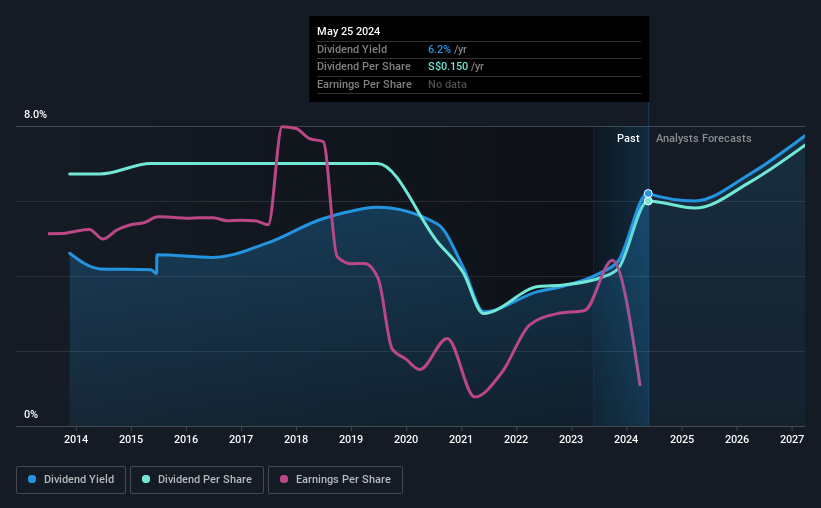Singapore Telecommunications (SGX:Z74) Is Increasing Its Dividend To SGD0.079
The board of Singapore Telecommunications Limited (SGX:Z74) has announced that it will be paying its dividend of SGD0.079 on the 20th of August, an increased payment from last year's comparable dividend. This will take the dividend yield to an attractive 6.2%, providing a nice boost to shareholder returns.
See our latest analysis for Singapore Telecommunications
Singapore Telecommunications' Earnings Easily Cover The Distributions
While it is great to have a strong dividend yield, we should also consider whether the payment is sustainable. Based on the last payment, the company wasn't making enough to cover what it was paying to shareholders. Without profits and cash flows increasing, it would be difficult for the company to continue paying the dividend at this level.
According to analysts, EPS should be several times higher next year. Assuming the dividend continues along recent trends, we estimate that the payout ratio could reach 65%, which is in a comfortable range for us.
Dividend Volatility
Although the company has a long dividend history, it has been cut at least once in the last 10 years. Since 2014, the dividend has gone from SGD0.168 total annually to SGD0.15. This works out to be a decline of approximately 1.1% per year over that time. Generally, we don't like to see a dividend that has been declining over time as this can degrade shareholders' returns and indicate that the company may be running into problems.
Dividend Growth Potential Is Shaky
With a relatively unstable dividend, it's even more important to see if earnings per share is growing. Over the past five years, it looks as though Singapore Telecommunications' EPS has declined at around 24% a year. Dividend payments are likely to come under some pressure unless EPS can pull out of the nosedive it is in. Over the next year, however, earnings are actually predicted to rise, but we would still be cautious until a track record of earnings growth can be built.
We're Not Big Fans Of Singapore Telecommunications' Dividend
Overall, while the dividend being raised can be good, there are some concerns about its long term sustainability. The company isn't making enough to be paying as much as it is, and the other factors don't look particularly promising either. We don't think that this is a great candidate to be an income stock.
Market movements attest to how highly valued a consistent dividend policy is compared to one which is more unpredictable. However, there are other things to consider for investors when analysing stock performance. Case in point: We've spotted 3 warning signs for Singapore Telecommunications (of which 1 makes us a bit uncomfortable!) you should know about. Is Singapore Telecommunications not quite the opportunity you were looking for? Why not check out our selection of top dividend stocks.
Have feedback on this article? Concerned about the content? Get in touch with us directly. Alternatively, email editorial-team (at) simplywallst.com.
This article by Simply Wall St is general in nature. We provide commentary based on historical data and analyst forecasts only using an unbiased methodology and our articles are not intended to be financial advice. It does not constitute a recommendation to buy or sell any stock, and does not take account of your objectives, or your financial situation. We aim to bring you long-term focused analysis driven by fundamental data. Note that our analysis may not factor in the latest price-sensitive company announcements or qualitative material. Simply Wall St has no position in any stocks mentioned.

 Yahoo Finance
Yahoo Finance 
